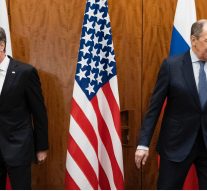
De-escalating tensions in Ukraine is in the interest of the European Union
Employment and Social Affairs 29 January 2022Estimated time of reading: ~ 2 minutes
A conflict in Europe is not in anyone’s interest, even more because it would definitely hamper the recovery after Covid-19 pandemic namely considering the crisis of energy prices. That is another reason why dialogue with Russia must prevail, despite Moscow’s military build-up in and around the border with Ukraine.
The rising tensions at the Ukrainian-Russian border are developing together with a significative diplomatic effort to relaunch dialogue with Moscow, as highlighted by the meeting between Russia, the United States and Nato – in Geneva, Brussels and Vienna at the beginning of January – to discuss Moscow’s demands for “security guarantees”. Russian Foreign Minister Sergei Lavrov said on 27th of January that the US responses to Moscow’s security demands gave hope of starting a serious dialogue, but only on secondary questions and not on the fundamental issues. “The main issue is our clear position on the inadmissibility of further expansion of NATO to the East and the deployment of strike weapons that could threaten the territory of the Russian Federation”, he underlined.
That’s unfortunately the main problem at stake in Ukraine’s crisis and it is rooted back in the unresolved situation arisen after EuroMaidan in 2014 and in the consequent Russian occupation of Crimea and Donbass. Russia wants indeed a friendly government in Ukraine, as a security guarantee and as the only condition to give back to Kiev the occupied territories, because it is not ready to accept the scenario of a country at its border entering in Nato. Moscow would request even more, demanding a return to 1997 situation with most of Eastern Europe’s Country not part of the Atlantic Alliance. “The Russian proposals reflect indeed the position of Russian authorities aiming to roll back evolutions that took place since 1990 to the detriment of European unity and in breach of the independence and sovereignty of former Soviet states. This type of delimitation of spheres of influence does not belong to 2022”, commented EU High representative Josep Borrell.
On the other hand, off course, this is not acceptable at all by Nato that has clearly stated it is not willing to abandon the “open doors” policy. “What we have made clear is that we will not compromise on some core principles”, said Nato’s secretary general Jens Stoltenberg during a press conference on 26th of January. “And one of them is, of course, that every nation has the right to choose its own path. So Nato respects a country or a nation when they decide to apply for Nato membership, as for instance, Ukraine, or when they decide to not apply for a Nato membership as Finland and Sweden have done. So, this is about respecting the right for self-determination.”, he explained.
Thus, beyond Ukraine, the entire Europe security architecture is at stake. Situations similar to the one in Ukraine are present indeed also in Georgia and Moldova, with Russian forces occupying part of the territory in order to hamper pro-Western government. Unfortunately Moscow is not ready to change this approach as it believes that the actual situation is already too much damaging for its own security. That’s why the EU should aim at de-escalating tensions, because dialogue is the only concrete way to avoid a dangerous military build-up not useful to anyone.
Written by: Valerio Palombaro
Submitted on: 28.01.2022.



